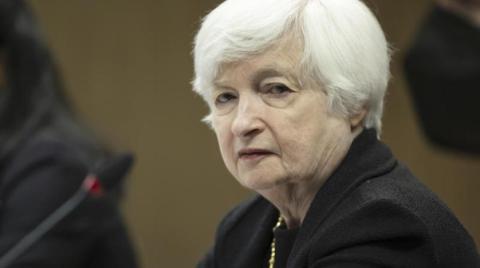
The world’s biggest oil-producing nations cutting production at a time of soaring energy costs is “unhelpful and unwise” for global economic growth, the US Treasury secretary has warned, amid intense pressure from sky-high inflation.
Ahead of meetings hosted by the International Monetary Fund in Washington this week, Janet Yellen said the move by Opec+ – the oil production cartel led by Saudi Arabia, plus Russia – risked undermining the world economy.
The Biden administration has reacted angrily to last week’s decision to cut daily output by 2m barrels, more than expected, describing it as a geopolitical move. Meanwhile, Yellen said it would risk hurting developing countries more than most.
“Opec’s decision is unhelpful and unwise,” she said in an interview with the Financial Times. “It’s uncertain what impact it will end up having, but certainly, it’s something that, to me, did not seem appropriate, under the circumstances we face. We’re very worried about developing countries and the problems they face.”
Her warning comes ahead of sharp downgrades for global growth expected from the International Monetary Fund this week. Attended by more than 190 countries from around the globe, the fund will hold its annual meeting against a backdrop of fragmenting cooperation between nations over the inflation shock exacerbated by Russia’s war in Ukraine. Discussions will also focus on the impact of rising interest rates around the world, and the effects of Russia’s war in Ukraine.
Yellen said: “We’re going to exchange views on whether our countries are addressing these problems, and try to consider whether our collective reaction adds up to something that is sensible, and the best we can do, in that difficult environment.”
The IMF is expected this week to downgrade its growth forecasts for the world economy. Erik Nielsen, group chief economics adviser at UniCredit bank in London, said: “Both Opec+’s decision and the US response are important wake-up calls for us Europeans.
“The huge supply shock is eroding real income at a frightening pace and it is now being supplemented by a demand shock, illustrated by plummeting confidence indices. Not surprisingly, the IMF has indicated that it will revise down – again – its forecast for global growth, as most other forecasters have done in recent weeks.”
The UK chancellor, Kwasi Kwarteng, is due to fly to the IMF’s annual meetings later this week at a delicate moment for the UK economy, amid the shock to the global economy from high inflation and market turmoil sparked by his mini-budget. The sweeping tax cuts, which mainly benefit the wealthy, and lack of independent assessment by the Office for Budget Responsibility spooked investors, sending the pound sliding and the cost of government borrowing soaring.
Since then, Kwarteng has been handed independent forecasts by the OBR on the state of the UK finances that are expected to show a hole of more than £60bn left by his tax cuts and a sharply slowing economic growth outlook. The forecasts are due to be published alongside a fiscal statement planned for 23 November, which is expected to be brought forward to this month.
It comes as figures show business activity declining across most regions of the UK as companies struggle with soaring costs, according to a survey from NatWest.
The lender said there were only a few remaining pockets of growth across the UK in September, according to its regular monthly snapshot of regional private sector activity. Demand for goods and services fell in most areas amid increased uncertainty around the outlook, which took a toll on hiring.
Business activity fell in all but three of the 12 monitored UK regions and nations last month. The fastest rates of contraction were seen in Northern Ireland and the south-west, while London was the best-performing region, despite seeing growth slow to a 20-month low, ahead of Yorkshire and Humber. Business activity in the south-east was unchanged on the month, after dipping in August.
Business leaders are growing increasingly concerned about the impact of the cost of living crisis on households and the wider economy. Former Sainsbury’s boss Justin King, who now sits on Marks & Spencer’s board, said the emergency was the worst since the 1970s.
Responding to questions over Asda’s decision to offer cheap meals to over-60s, he told Sky News: “Supermarkets have always taken very seriously the role that they play in helping their customers, if you like, make ends meet.
“The challenge hasn’t been as great as this since … the 1970s, which is probably the last time the challenges to households were as great.”












